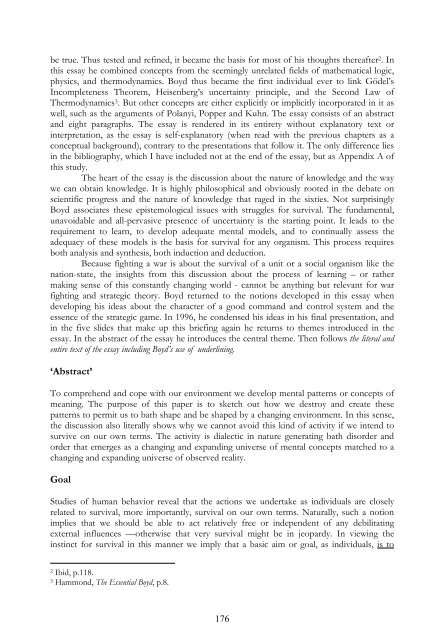Science, Strategy and War The Strategic Theory of ... - Boekje Pienter
Science, Strategy and War The Strategic Theory of ... - Boekje Pienter
Science, Strategy and War The Strategic Theory of ... - Boekje Pienter
You also want an ePaper? Increase the reach of your titles
YUMPU automatically turns print PDFs into web optimized ePapers that Google loves.
e true. Thus tested <strong>and</strong> refined, it became the basis for most <strong>of</strong> his thoughts thereafter 2 . Inthis essay he combined concepts from the seemingly unrelated fields <strong>of</strong> mathematical logic,physics, <strong>and</strong> thermodynamics. Boyd thus became the first individual ever to link Gödel’sIncompleteness <strong>The</strong>orem, Heisenberg’s uncertainty principle, <strong>and</strong> the Second Law <strong>of</strong><strong>The</strong>rmodynamics 3 . But other concepts are either explicitly or implicitly incorporated in it aswell, such as the arguments <strong>of</strong> Polanyi, Popper <strong>and</strong> Kuhn. <strong>The</strong> essay consists <strong>of</strong> an abstract<strong>and</strong> eight paragraphs. <strong>The</strong> essay is rendered in its entirety without explanatory text orinterpretation, as the essay is self-explanatory (when read with the previous chapters as aconceptual background), contrary to the presentations that follow it. <strong>The</strong> only difference liesin the bibliography, which I have included not at the end <strong>of</strong> the essay, but as Appendix A <strong>of</strong>this study.<strong>The</strong> heart <strong>of</strong> the essay is the discussion about the nature <strong>of</strong> knowledge <strong>and</strong> the waywe can obtain knowledge. It is highly philosophical <strong>and</strong> obviously rooted in the debate onscientific progress <strong>and</strong> the nature <strong>of</strong> knowledge that raged in the sixties. Not surprisinglyBoyd associates these epistemological issues with struggles for survival. <strong>The</strong> fundamental,unavoidable <strong>and</strong> all-pervasive presence <strong>of</strong> uncertainty is the starting point. It leads to therequirement to learn, to develop adequate mental models, <strong>and</strong> to continually assess theadequacy <strong>of</strong> these models is the basis for survival for any organism. This process requiresboth analysis <strong>and</strong> synthesis, both induction <strong>and</strong> deduction.Because fighting a war is about the survival <strong>of</strong> a unit or a social organism like thenation-state, the insights from this discussion about the process <strong>of</strong> learning – or rathermaking sense <strong>of</strong> this constantly changing world - cannot be anything but relevant for warfighting <strong>and</strong> strategic theory. Boyd returned to the notions developed in this essay whendeveloping his ideas about the character <strong>of</strong> a good comm<strong>and</strong> <strong>and</strong> control system <strong>and</strong> theessence <strong>of</strong> the strategic game. In 1996, he condensed his ideas in his final presentation, <strong>and</strong>in the five slides that make up this briefing again he returns to themes introduced in theessay. In the abstract <strong>of</strong> the essay he introduces the central theme. <strong>The</strong>n follows the literal <strong>and</strong>entire text <strong>of</strong> the essay including Boyd’s use <strong>of</strong> underlining.‘Abstract’To comprehend <strong>and</strong> cope with our environment we develop mental patterns or concepts <strong>of</strong>meaning. <strong>The</strong> purpose <strong>of</strong> this paper is to sketch out how we destroy <strong>and</strong> create thesepatterns to permit us to bath shape <strong>and</strong> be shaped by a changing environment. In this sense,the discussion also literally shows why we cannot avoid this kind <strong>of</strong> activity if we intend tosurvive on our own terms. <strong>The</strong> activity is dialectic in nature generating bath disorder <strong>and</strong>order that emerges as a changing <strong>and</strong> exp<strong>and</strong>ing universe <strong>of</strong> mental concepts matched to achanging <strong>and</strong> exp<strong>and</strong>ing universe <strong>of</strong> observed reality.GoalStudies <strong>of</strong> human behavior reveal that the actions we undertake as individuals are closelyrelated to survival, more importantly, survival on our own terms. Naturally, such a notionimplies that we should be able to act relatively free or independent <strong>of</strong> any debilitatingexternal influences —otherwise that very survival might be in jeopardy. In viewing theinstinct for survival in this manner we imply that a basic aim or goal, as individuals, is to2 Ibid, p.118.3 Hammond, <strong>The</strong> Essential Boyd, p.8.176
















